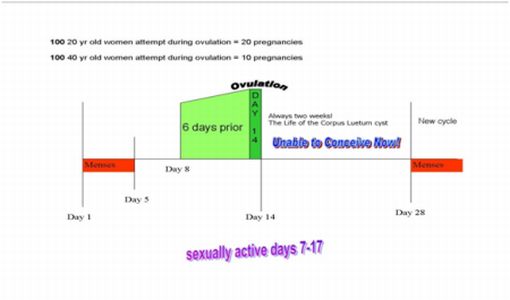Dr. Margit Lister, from Wasatch OBGYN, says shedding extra pounds could improve your chances of getting pregnant.
The first thing that I like to discuss with patients when they are concerned about infertility or not being able to get pregnant is their expectations of pregnancy.
There are some basic statistics that are important to understand for women who wish to get pregnant. First, if you take 100 twenty year-old women and they are sexually active on the day of ovulation, ONLY 20 of the 100 women will become pregnant that day. The simple math is that 80% of couples will fail attempting pregnancy when they get the timing right, and lots of couples get the timing wrong.
Now if you take the same 100 women and now they are 40 year-old, only 10 will get pregnant with sexual activity on the day of ovulation, a 90% failure rate. The older your eggs are the higher the failure rate.

The next statistic is 86% of couples will conceive within one year of actively trying for pregnancy. This increases to 93% if you try for 2 years. Not everyone gets pregnant on their first time, though it may seem like it if you are having trouble getting pregnant.
So let’s talk about timing. You need to understand your cycle length in order to figure out your fertile time. So, let’s get the basics out of the way.
Cycle Length: This is the number of days from the first day of your last menstrual cycle to the first day of your next menstrual cycle.
Ovulation or Day of ovulation: This is the day that you are most fertile or the day that your ovary releases an egg.
When you have a regular cycle length, usually between 21 and 35 days, you are likely ovulating. But when are you fertile? You are fertile for exactly one day 2 weeks prior to the onset of your last menstrual cycle, this is the day you ovulate. You can get pregnant on that day and the 6 days prior to that day but not one day after. The reason you can get pregnant 6 days prior to the day of ovulation is because the sperm stay alive in the vagina for 7 days. So you can have sex on Monday and not ovulate until Friday, but still get pregnant. But you can’t get pregnant if you have sex on Saturday.
Timing is important. I tell my patients, be sexually active EARLY in the month and you are more likely to get pregnant than later in the month. If you are lucky enough to feel yourself ovulate, have sex that day!
Now that we know it takes patience and some knowledge of your menstrual cycle, what else can cause problems?
If you divide infertility equally between men and women, 40% is the women’s problem and 40% it’s the man’s problems and 20% of the time we don’t really understand the cause.
So let’s talk about women. Most of the time, it’s a problem with ovulation, or the release of the egg by the ovary. If you have a 28 day cycle every month, this isn’t your problem. If you cycle is very irregular and rarely monthly, this is likely one of your problems. The good news is this is easily fixed with medications.
The next issues for women are anatomical problems with the tubes not being open from endometriosis or infection or distortion of the uterine cavity. If you have extremely painful periods, this could be a sign of endometriosis.
If you have tried for over a year to get pregnant and have not been successful, see your doctor. They can check some simple blood test, check for ovulation or patency of your tubes and answer your questions.
For male infertility, a semen analysis is all that is needed. This usually can be preformed at most labs and will tell you the needed information. Having to repeat this test is common.
What else can you do to increase your ability to get pregnant?
For women and men:
Check your medications, some medications can affect your ability to become pregnant. The best medication for women trying for pregnancy is a prenatal vitamin!
Make sure your BMI is less than 30. There is strong evidence that women (and men) with a high BMI are less like to get pregnant and more likely to LOOSE the pregnancy if they do get pregnant. So shed those extra pounds!
Stop smoking for both men and women. This decreases your ability to get pregnant and also increases your miscarriage rate.
Watch alcohol and caffeine intake. Moderation is the key.
Previous cancer treatment (radiation or chemotherapy) may limit your ability to conceive.
Stress. Learn to handle your stress. Meditate, forgive and accept your body for not getting pregnant. Seek professional counseling if feel your inability to get pregnant is negatively affecting your life.
The bottom line is that if you have been trying for pregnancy for over 2 years, have irregular or painful cycles or are over the age of 35, you may need your doctor’s help with achieving pregnancy.
Dr. Margit Lister is an OBGYN with Intermountain Health Care. If you would like to schedule an appointment, visit: www.intermountainclinics.org.















Add comment